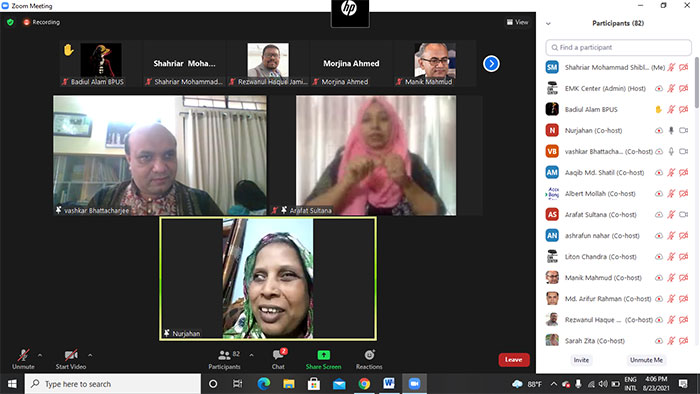With an aim to promote disability-inclusive entrepreneurship and find a way out to increase the social dignity of COVID-19 affected women with disabilities in order to give them a solid chance to prove their potential and worth in front of their family and society both at the personal level and professional level, YPSA, an organization for sustainable development, jointly, with the a2i (Aspire to Innovate) and EMK Center, organized a virtual advocacy meeting on 23rd August 2021 under its project “Promoting decent employment and SRHR for COVID-19 affected women with disabilities” supported by EMK Center, Dhaka.
Moderated by UNESCO award-winning disability rights activist Vashkar Bhattacharjee, the meeting was dignified by the participation of dozens of relevant stakeholders across the country which includes 55 organizations working for persons with disabilities (including OPDs), 7 international NGOs, several representatives from the ICT ministry of the Bangladesh government, several corporate representatives, several persons with disabilities, and entrepreneurs with disabilities.
Almost all of the participants focused on the fact that, among persons with disabilities, women are the poorest of the poor because discrimination cuts off their escape routes from poverty and deprives them of all mainstream development initiatives, as they lack the necessary skills and knowledge to perform efficiently in their professional and personal life. This is even more pronounced during the COVID 19 pandemic. For too long, business ownership has been overlooked as a viable option for individuals with disabilities. It was assumed that the term ‘entrepreneurship with disabilities’ was an oxymoron.
Today, all over the world, thousands of people with disabilities are dispelling this myth by starting wildly successful businesses of all kinds. Yet, in Bangladesh, there have not been any significant initiatives taken to mainstream this physically challenged population, and improve the quality of their professional and personal life apart from some scattered initiatives by a handful of government and non-government agencies that barely addresses the issue by providing some charity services.

Ms Nurjahan, an award-winning entrepreneur with a disability, during her experience sharing, said that she has been running her business swiftly and successfully until the COVID 19 hit Bangladesh. Now she is undergoing a loss and could not find any support from anywhere.
Another entrepreneur, Ms Chumki Biswas, also focused on the same issue and urged the participants and the organizers to find a dedicated way out to support those who are facing the same problems as her.
Ms Ashrafunnahar Mishti, founder of WDDF, a world-renowned disability and women rights activist, thanked the organizers for such a time–demanding initiative and insisted everyone to do their best to promote entrepreneurship for those who are being excluded due to their disability and gender. She also said that it is high time to tackle this issue head-on.
The acting director of EMK centre, Mr Asif Uddin Ahmed, said, the EMK centre has been working with YPSA and many other organizations on the very issue for several years now and they are thinking of expanding their involvement and support and, if necessary, ready to collaborate with the a2i for brining about some innovative solution in the coming years.
Mr Manik Mahmud, head of social innovation cluster and Mr Rezwanul Haque Jami, team lead of rural e-commerce & head of commercialization of the a2i of the ICT Division said that the government is currently working on a digital solution (Ekshop) which will not only provide entrepreneurs with disabilities the opportunity to showcase and sell their products but also provide incentives including monetary and technical support to those who need it from all over the country.
YPSA chief executive, Md Arifur Rahman, in his presentation, said that YPSA has been running its Inclusive Finance initiative for almost a decade now in the greater Chittagong division and thinking of expanding its reach so that many more persons with disabilities could become economically independent like the hundreds who have established themselves as a role model in the greater Chittagong area.
Among the others, disability rights activist and executive director of Access Bangladesh Foundation, an Ashoka fellow, Mr Albert Mollah and UNDP’s national consultant (Anondomela Initiative), Ms Sarah Zita attended the meeting as panelists.

